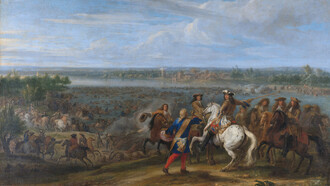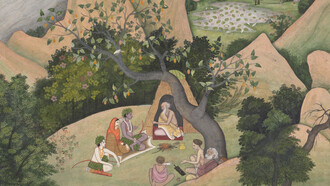In today's fast-paced world, Hercules' tenth labor still teaches us valuable lessons. Picture Hercules being tasked with retrieving red cattle from the fearsome Geryon. Despite the tough odds, Hercules took on Geryon, a monster with three heads and six arms. Hercules shows us the importance of never giving up and using smart thinking to overcome challenges. His courage inspires us to face our own fears bravely.
A jealous cousin of Hercules named King Eurystheus and Hera, assigned Hercules twelve labors as part of his punishment for his past deeds. In the Tenth Labor, he was given the task of capturing Geryon's Majestic Red Cattle. Completing these labors was meant to redeem Hercules for his past misdeeds and earn him forgiveness from the gods. Hera, Zeus's wife, harbored resentment towards Hercules due to his illegitimate birth, and she influenced Zeus's decision to impose these labors on him. It's believed that Hera's influence drove Hercules to madness, causing him to kill his own family.
Thus Hercules needed penance as he was dealing with deep seated guilt. This was to come through the completion of the labors. He did not fear anything.
In more detail, imagine Hercules, unfazed by the daunting challenges ahead, setting out on his journey with boldness to claim the red cattle. It started by crossing the blistering Libyan desert, he even dared to challenge the sun god Helios for relief from the scorching heat. Impressed by his bravery, Helios gifted Hercules with a goblet for him to sail to his destination. With this newfound support, Hercules continued his voyage to the island of Erythia.
Thus, upon arrival, the emergence of challenge two. Hercules was met with immediate hostility from Orthrus. In Greek mythology, Orthrus is typically depicted as a fierce creature with two heads, a serpent's tail, and a menacing appearance, often guarding the herds of Geryon. With swift action, Hercules defeated Orthrus using his mighty club, displaying his strength and bravery in the face of danger.
As aforementioned, the next trial was to defeat Geryon, a powerful giant who resided on the island of Erythia. He was situated between Europe and Libya. Geryon’s prized possession was the red cattle, which was what King Eurystheus of Tiryns tasked Hercules to capture.
To get to Geryon, Hercules had to defeat Eurytion, who is often depicted as a robust and daunting figure. He was much like a typical warrior or herdsman of ancient Greece. Eurytion's physical attributes were associated with strength and prowess in battle. Hercules also defeated Eurytion as part of his penance.
Upon hearing news of the brawl and the death of Orthus and Eurytion, Geryon confronted Hercules. What followed next was a fierce battle of titanic proportions between the two adversaries. In the climax of their confrontation, Hercules unleashed a barrage of arrows, ultimately delivering a fatal blow to Geryon, marking the end of their epic struggle.
In the beginning, Hercules took Geryon's cattle easily. But on his way back to Greece, he faced many challenges. In Liguria, two sons of Poseidon attacked him, so he had to fight them to protect the cattle. Then, in Rhegium, a bull ran away to Sicily, and that is why the area got its name, "Italy." It was from the word bull, "italus." Later, Hercules met Eryx, another son of Poseidon, who wanted the escaped bull for himself. Eryx agreed to give it back only if Hercules beat him in a wrestling match. After three tough fights, Hercules won and got the bull back, ensuring its return to the herd.
As Hercules neared the end of his journey by the Ionian Sea, his stepmother Hera, who was the queen of the gods and Zeus' wife, chose to make trouble. She didn't like Hercules because he was Zeus' son with a mortal woman named Alcmene. Hera wanted to punish Zeus for being unfaithful. So, she directed her anger towards Hercules. In this last part of his labor, Hera sent a gadfly to scatter the cattle, creating a new obstacle for Hercules to deal with.
As he pursued the scattered herd, he encountered a mountain range blocking his path. To overcome this obstacle, Hercules used his strength to split the mountains apart, creating a new path forward. This action highlighted his determination to overcome difficulties in completing his labor, especially those caused by Hera's interference with the gadfly.
Eventually, Hercules delivered the cattle to King Eurystheus, who was terrified and astonished by their size and ferocity. The King sacrificed them to satisfy Hera.
In today's world, Hercules' Tenth Labor offers valuable insights. For example, we can use them for business, for altruistic purposes, for personal, and even for our environment. Firstly, his unwavering determination to retrieve the cattle reflects the resilience entrepreneurs need to bounce back from business setbacks. Secondly, his resourcefulness mirrors how communities creatively manage disasters with limited resources.
Following, Hercules' bravery against mighty foes parallels firefighters' courage in confronting dangerous flames to save lives. Another valueable lesson is how Hera's interference mirrors political opposition from powerful entities affiliated with conflicts with divine forces.
Lastly, Hercules' humility and sacrifice resonate with healthcare workers prioritizing others' needs during crises, highlighting the importance of selflessness. Each comparison reveals the human experience and resilience in the face of adversity, bridging ancient myths with modern challenges.
Hercules' journey teaches us valuable lessons for our daily lives. His determination in the face of challenges shows us the importance of never giving up, whether we're dealing with work problems or personal struggles.
Like Hercules, we can find the inner strength to keep going. His ability to think creatively reminds us to be resourceful when things don't go as planned. We can learn to adapt and find solutions even when faced with unexpected difficulties. Hercules' bravery in facing tough situations encourages us to confront our own fears bravely. In our everyday lives, we can remember Hercules' example and believe in our ability to overcome obstacles and emerge stronger.















